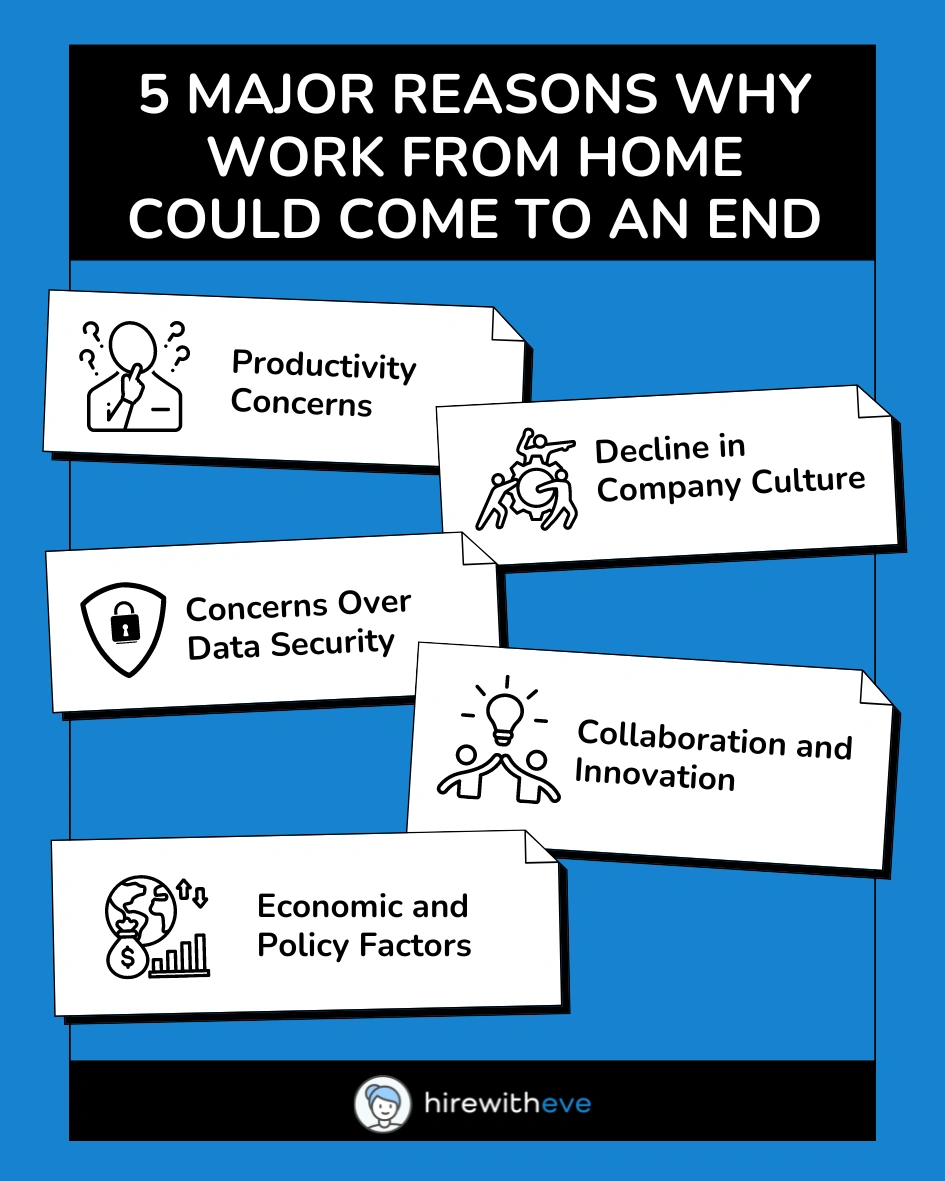Why Working From Home Could Come To An End
Why Working From Home Could Come To An End

The pandemic created a global shift towards remote work, with millions of employees transitioning from traditional offices to home setups. For many, working from home became the new norm, offering flexibility and a better work-life balance. However, despite its popularity, recent trends and discussions indicate that the work from home end could be on the horizon. Companies, governments, and industry experts are beginning to question the long-term feasibility of remote work.
In this blog, we’ll explore the reasons why working from home may come to an end and the impact it could have on both businesses and employees.
Table of contents
The Evolution of Remote Work
Remote work wasn't a completely new concept when the pandemic hit, but its adoption was previously limited to certain sectors and roles. Tech companies, freelancers, and consultants had been accustomed to flexible work arrangements long before COVID-19.
However, when the pandemic struck, businesses of all sizes were forced to implement remote work policies, resulting in a massive surge in people working from home.
During the initial phases, the benefits of remote work were widely recognized — higher employee satisfaction, reduced commute times, and greater access to talent pools across different geographies. But now, as the world returns to normal, signs suggest that the work from home end is in sight. Many companies are rethinking their remote work policies for various reasons, which we will explore in detail.
Reasons Why Work From Home Could Come To An End

Productivity Concerns
While some industries reported higher productivity levels from employees working remotely, others have raised concerns about reduced efficiency and focus. Without the structured environment of an office, distractions at home can hinder productivity.
Additionally, tasks that require collaboration or real-time decision-making have proven to be slower in remote settings. As a result, some organizations are reconsidering their long-term remote work policies, which could lead to the work from home end in many industries.
Decline in Company Culture
One of the significant drawbacks of remote work is the challenge of maintaining a strong company culture. Work environments foster collaboration, creativity, and a sense of belonging — elements that are harder to achieve in a remote setting.
For HR managers and talent acquisition specialists, integrating new employees into a company culture remotely has proven to be a challenge. The lack of face-to-face interactions and team bonding can dilute a company’s cultural identity, leading to calls for a work from home end.
Concerns Over Data Security
Cybersecurity risks have increased with the rise of remote work. Home networks are generally less secure than corporate environments, making businesses more vulnerable to cyberattacks.
As cyber threats continue to grow, many organizations are pushing for employees to return to more secure, on-premise environments, leading to discussions around the work from home end.
Collaboration and Innovation
While video conferencing tools and cloud-based platforms have made remote collaboration easier, there’s no denying that in-person interaction can foster more spontaneous and creative discussions.
Many leaders believe that innovation thrives in physical workplaces, where employees can brainstorm, solve problems, and exchange ideas face-to-face. The absence of this element has sparked debates around the work from home end, especially in industries that rely on innovation for growth.
Economic and Policy Factors
Governments in various countries are also weighing in on the return to work. Policies are being implemented to encourage employees to come back to office spaces, particularly in urban areas where local businesses rely on office workers.
Additionally, some companies are choosing to downsize their remote workforce due to the costs of maintaining compliance across different regions. These economic and regulatory changes could accelerate the work from home end.
Impact on Businesses and Employees
Impact on Businesses
For businesses, a return to office-based work could mean an improvement in team dynamics, faster decision-making, and more innovation. Companies that rely on close-knit collaboration may benefit from having their employees in a shared physical space. Additionally, the ability to monitor and mentor employees more effectively in the office is another reason driving the work from home end for some organizations.
However, the transition back to in-person work could also increase overhead costs as companies re-open their office spaces, upgrade facilities, and manage a full-time, on-site workforce. This shift may also lead to a reduction in talent pools, especially if businesses reduce remote positions that previously allowed them to hire from different geographical locations.
Impact on Employees
For employees, the work from home end might bring both positive and negative changes. On the one hand, returning to the office could restore clearer work-life boundaries, provide social interaction, and reduce feelings of isolation that some remote workers experience. Additionally, junior employees who benefit from mentorship and learning through observation may prefer being in an office setting.
On the other hand, many employees who have adapted to working remotely may struggle with the return to commuting and rigid office hours. The flexibility that remote work provides, particularly for working parents or those with other responsibilities, will be missed if remote work ends. The work from home end could also cause friction with employees who have come to expect more autonomy and flexibility in their work arrangements.
Potential Alternatives to Remote Work
While a complete work from home end may seem inevitable for some industries, there are alternatives to consider:
Hybrid Work Models
One popular compromise is the hybrid work model, where employees split their time between home and the office. This model offers the best of both worlds, combining the flexibility of remote work with the collaboration and structure of office-based work. Companies embracing the hybrid model are less likely to face resistance from employees who value work-life balance.
Flex Time Policies
Flex time is another alternative that could soften the blow of a work from home end. Instead of enforcing strict office hours, companies can allow employees to choose when they come into the office. This level of flexibility can make the transition smoother and less disruptive.
Digital Nomadism
While this is a more niche option, some companies may continue to support employees who want to work from anywhere, not just home. Digital nomadism allows employees to travel while working, offering them flexibility in location while still maintaining productivity.
Conclusion
The era of working from home revolutionized the way we work, but the work from home end is becoming a reality for many industries. Whether due to productivity concerns, company culture, or economic and policy factors, a return to the office seems inevitable for many organizations.
However, the transition doesn’t have to be all or nothing. Hybrid models and flexible work arrangements offer alternatives that can ease the shift back to in-person work while maintaining some of the benefits of remote work.
For HR managers and talent acquisition specialists, preparing for this change is crucial. The work from home end might bring new challenges in attracting and retaining talent, but it also provides opportunities to rethink how we structure work in the post-pandemic world.
Target Your Talent
Unlock tailored solutions for your recruitment and hiring needs with Eve Platform's extensive case study library.
Subscribe now to enhance your HR expertise and excel in your role.
Free Resources

Transforming Hiring: 7 Key Recruiting Metrics
Enhancing recruitment processes with data-driven insights for better hiring outcomes.

Reducing Hiring Bias with Hirewitheve.
Utilizing Hirewitheve to combat bias and streamline recruitment processes effectively.

Hiring Detail-Oriented Candidates
HirewithEve enhances hiring by accurately assessing candidate's attention to detail-oriented.
